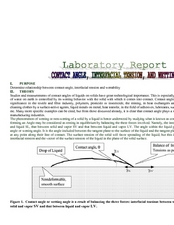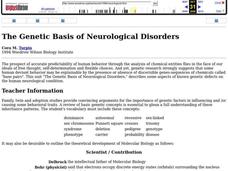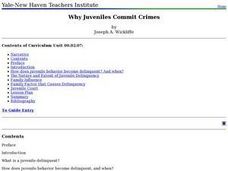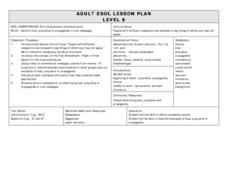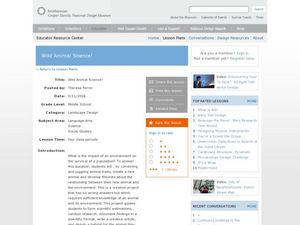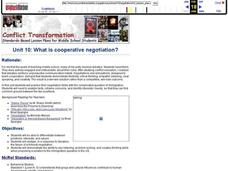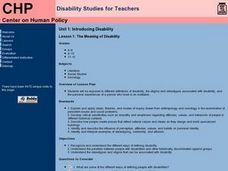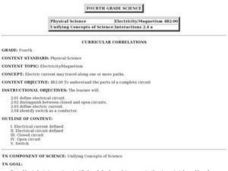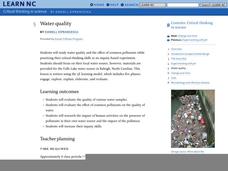Curated OER
Protagoras
In this online interactive philosophy learning exercise, high schoolers respond to 10 short answer and essay questions about Protagoras by Plato. Students may check some of their answers on the interactive learning exercise.
Curated OER
Polymerization Experiments
Students study the concepts of polymerization and the function of crosslinkage. In this polymer lesson plan students complete a lab activity and write down their observations.
Curated OER
Contact Angle. Interfacial Tension and Wetting
Students determine the contact angle of water on different surfaces. In this physics instructional activity, students calculate their percent error using a mathematical formula. They explain the advantages of using non-wetting surface...
Curated OER
Chapter 8: Deviance and Social Control
In this deviance and social control worksheet, students respond to 14 fill in the blank questions and 15 matching questions pertaining to crime and how societies attempt to control it.
Curated OER
The Genetic Basis of Neurological Disorders
Students explore neurological disorders. They examine the presence and absence of discernible genes. Students describe neruological diseases and draw faces of affected persons. They play a human neurology disorders learning game.
Curated OER
Identifying an Author's Purpose
Learners read, "Research Shows TV PSAs Effective In Reducing Teen Marijuana Use", discuss the article with questions imbedded in the lesson and write their own PSA.
Curated OER
Moral Development: Lawrence Kohlberg
Students study the stages of moral development. In this psychology lesson, students explore Lawrence Kohlberg's stages of moral development as they read, respond to, and evaluate a moral development scenario.
Curated OER
Why Juveniles Commit Crimes
Young scholars examine the reasons why juveniles commit crimes. As a class, they watch movies showing juveniles committing crims and discuss the impact on societies. They take a field trip to adult and juvenile courts and compare their...
Curated OER
Getting to Know Yourself: Developing and Accessing Intrapersonal Intelligence Among Early Adolescents
Students improve understanding of the concept of self-awareness by differentiating the internal from the external world. They develop a vocabulary to describe feelings and to understand the uniqueness and variations of people's inner...
Curated OER
Agree To Disagree
Young scholars discover their own talents and preferences and determine how they apply to the world of work with a group activity. They express their choice and discuss their positions.
Curated OER
Rendering a Resolution
Students explore the concept of peace. In this International Peace Day lesson plan, students determine their reaction to a scenario that requires them to benefit themselves or benefit everyone. Students discuss the scenario and discuss...
Curated OER
Comparing Cultures
Students examine the nature of culture, and compare/contrast various cultures and their artifacts and ceremonies. They develop a class list of artifacts, complete a worksheet, and create a poster or diorama describing an object that is...
Curated OER
Examining the Ties Between Abolitionism and the Women's Rights Movement
Students examine the historical link between the abolition and women's movements. After a brief introduction and mini-lecture, students work in pairs or small groups to complete a web quest to answer instructor provided questions...
Curated OER
Wild Animal Science
Students discover how environmental factors impact the survival of a population. For this landscape design lesson, students create a new animal and discuss the relationship between the animal and its environment before creating a habitat...
Curated OER
What is cooperative negotiation?
Tenth graders differentiate between positions, interests, and values. In this current events lesson, 10th graders analyze, in a response to literature, the failure of a fictional negotiation. Students demonstrate the ability to use...
Curated OER
Korean And Vietnam Conflicts: Similarities And Differences
Eighth graders study the historical significance of the Korean and Vietnam Wars in this unit of study. They investigate the different ideologies that were involved and examine the effect of the wars on local veterans.
Curated OER
The Meaning of Disability
Students discover the different types of disabilities. They examine the stereotypes and stigmas associated with them and hear from a person who lived in an institution.
Curated OER
Paths of Electrical Currents
Fourth graders examine the paths that electrical currents travel. They create a current of electricity using flashlights, bulbs, batteries, wires and tape. They determine how to create a closed circuit that will light the bulb. They...
Curated OER
Animal Adaptations
students in groups to work on bulletin board, making a list of animal adaptations. They write an example of each body covering and find pictures of animals with these coverings. They mount pictures and label the covering. They should be...
Curated OER
The Roaring Twenties
In this Roaring Twenties Era worksheet, young scholars review a chapter as they identify 5 vocabulary terms or individuals quotes, eliminate 4 false statements, and identify 2 themes from the era of great change in the United States.
Curated OER
In-Group Favoritism
Learners discover how to cross social boundaries. In this character education lesson, students discuss the positive and negative impacts of favortism they witness in their local community as well as the international community. Learners...
Curated OER
Squares in the Light
Students collect and analyze data using a graph. In this algebra lesson, students explain their findings orally and with a graph. They use their knowledge to solve real life scenarios.
Curated OER
Water Quality
Students analyze water quality and turbidity of collected samples. In this physics lesson plan, students conduct tests to identify the suspended particles in the samples. They explain how human activities affect water quality.
Curated OER
The Genetic Basis of Neurological Disorders
Young scholars describe some aspects of known genetic defects on the human neurological condition. They participate in a variety of exercises including drawings, games, and analogies.




